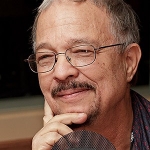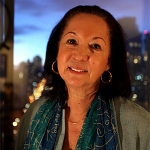Haitian filmmaker Arnold Antonin has made some of the best films about Haitian art, Haitian Culture and Haitian History. He spent many years in exile, but returned to Haiti in 1986 where he has since been an integral part of the Haitian people struggle for justice and development. He is known at home and abroad for his social, political, and cultural commitment. He was honored for his work with the Djibril Diop Mambety award at the International Film Festival in Cannes in 2002. He has received many awards including the Paul Robeson best film award three consecutive times at the African Diaspora FESPACO in Ouagadougou in 2007, 2009, and 2011. His latest documentary, “the Kingdom of Impunity,” clearly illustrates and analyzes the lack of justice in Haiti.
Francesca Canadé Sautman
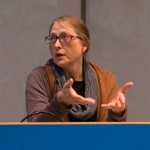 Curator of the Food seminar Full biography
Curator of the Food seminar Full biography
Michele Duvivier Pierre-Louis
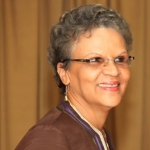 A global philanthropic figure, Michele Duvivier Pierre-Louis is the president of FOKAL (Fondasyon Konesans Ak Libète), a local Open Society foundation operating in Haiti and engaging with local communities, the Haitian government, and international organizations to develop the skills, resources, and institutions that Haitians can use to improve their lives and overcome political violence, natural disasters, and poverty. She is a former prime minister of Haiti, serving in the administration of President René Préval from September 2008 to November 2009, and only the second woman to have held that position. She earned an M.A. in economics at Queens College (CUNY).
A global philanthropic figure, Michele Duvivier Pierre-Louis is the president of FOKAL (Fondasyon Konesans Ak Libète), a local Open Society foundation operating in Haiti and engaging with local communities, the Haitian government, and international organizations to develop the skills, resources, and institutions that Haitians can use to improve their lives and overcome political violence, natural disasters, and poverty. She is a former prime minister of Haiti, serving in the administration of President René Préval from September 2008 to November 2009, and only the second woman to have held that position. She earned an M.A. in economics at Queens College (CUNY).
Photo: Josué Azor|FOKAL
Laënnec Hurbon
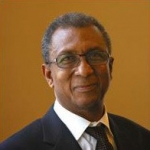 Laënnec Hurbon est docteur en Théologie (Institut catholique de Paris) et en Sociologie (Sorbonne). Il est directeur de recherches au CNRS et professeur à l’université Quisqueya de Port-au-Prince, dont il est l’un des membres fondateurs. Hurbon est spécialiste des rapports entre religion, culture et politique dans la Caraïbe et auteur de plusieurs ouvrages sur le vaudou haïtien.
Laënnec Hurbon est docteur en Théologie (Institut catholique de Paris) et en Sociologie (Sorbonne). Il est directeur de recherches au CNRS et professeur à l’université Quisqueya de Port-au-Prince, dont il est l’un des membres fondateurs. Hurbon est spécialiste des rapports entre religion, culture et politique dans la Caraïbe et auteur de plusieurs ouvrages sur le vaudou haïtien.
Haitian journalist, political activist, former spoke-person of the UN Secretary-General, Ban Ki-Moon (2007 – 2009), Michèle Montas is personally and actively committed to the problem of impunity in Haiti.
J-P Richard Narcisse
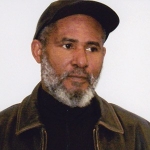 Poet, playwriter, novelist. J-P Richard Narcisse has published an extensive monograph on the investigation about the execution of the Coicou brothers by the government of Nord Alexis (Dans l’ombre d’une exécution). His most recent non-fiction novel is about the disappearance of the Haitian writer Jacques-Stephen Alexis in 1961 under the Duvalier regime.
Poet, playwriter, novelist. J-P Richard Narcisse has published an extensive monograph on the investigation about the execution of the Coicou brothers by the government of Nord Alexis (Dans l’ombre d’une exécution). His most recent non-fiction novel is about the disappearance of the Haitian writer Jacques-Stephen Alexis in 1961 under the Duvalier regime.
Alrich Nicolas
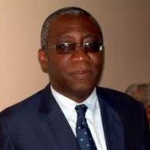 Alrich Nicolas is a sociologist, an economist and an expert in international relations. Former ambassador of Haiti in Germany, Haitian Minister of Foreign Affairs and Cults, Chief economist of the PNUD-Haiti, Nicolas has published numerous articles on economy and culture in scholarly journals on Latin America. He is actually professor of macro-economy at Université Quisqueya and the director of the Centre haïtien d’études et de recherches économiques et sociales (CHERIES) that he founded in 2012.
Alrich Nicolas is a sociologist, an economist and an expert in international relations. Former ambassador of Haiti in Germany, Haitian Minister of Foreign Affairs and Cults, Chief economist of the PNUD-Haiti, Nicolas has published numerous articles on economy and culture in scholarly journals on Latin America. He is actually professor of macro-economy at Université Quisqueya and the director of the Centre haïtien d’études et de recherches économiques et sociales (CHERIES) that he founded in 2012.
Lucie Carmel Paul
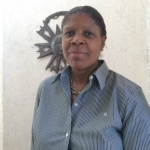 Lucie Carmel Paul has longstanding experience in the fields of management and administration in international, legal, and social issues. Before her current doctorate in French, her academic training was in biochemical sciences. She participated in the program of the University of the West Indies, St. Augustine, Trinidad, in August 1995, entitled « Environmental and Waste Management/Chemical Treatment, United Nations Program for the Environment» and taught as Adjunct-lecturer in Biochemistry and General Chemistry at the State University of Haiti between 1984 and 2005. She also served as a member of the governance and management committee of the State University of Haiti between 1993 and 1996. She was also the Minister of National Education, Youth and Sports from 2002 to 2003.
Lucie Carmel Paul has longstanding experience in the fields of management and administration in international, legal, and social issues. Before her current doctorate in French, her academic training was in biochemical sciences. She participated in the program of the University of the West Indies, St. Augustine, Trinidad, in August 1995, entitled « Environmental and Waste Management/Chemical Treatment, United Nations Program for the Environment» and taught as Adjunct-lecturer in Biochemistry and General Chemistry at the State University of Haiti between 1984 and 2005. She also served as a member of the governance and management committee of the State University of Haiti between 1993 and 1996. She was also the Minister of National Education, Youth and Sports from 2002 to 2003.
Between 1997 and 2002, she was the Head Delegate for Haiti to the Inter-American Women’s Commission of the Organization of American States (CIM/OEA) and to the Commission on the Status of Women at the United Nations (CSF/ONU). During this period, she was also General Director or Deputy Minister at the Ministry of the Status and Rights of Women of Haiti (MCFDF), and participated in formulating and analyzing public policy on gender equality, in particular in matters of property, on the condition of women and on literacy for adults. Between 1987 and 1989, she was a member of the coordinating committee of Misyon Alfa, a national literacy program organized by the Conference of Catholic Bishops of Haiti.
Her many responsibilities included, in particular, the Post-Beijing National Plan, with a review of public documents and policies and an awareness campaign with government agencies, international organizations and national women’s organizations. Notably, she was Director of the Program Fon Kore Fanm, financed by the Canadian International Development Agency (CIDA), and Coordinator of the Program of Institutional Reinforcement (PRI) for the MCFDF, supported by UNDP and UNFPA.
Lucie Carmel Paul has published on education and the environment, as well as on human rights in Haiti during the period from 1987 to 1990, and has presented many talks and papers on the status of women and gender between 1988 and 2000, including the formulation and elaboration of pedagogical tools for advocating on matters concerning women’s rights, in Creole and French, between 1996 and 2002. In 2006, she gave a talk on this topic at St-Francis College, Brooklyn. Since 2005 she has been giving papers and talks on matters of political representation, electoral participation by women and on the impact of gender-based violence.
Her activism and dedication to the causes of equality and development were recognized by a Congressional Merit Award for Community Involvement presented to her in March 2006 by the Office of Queens Representative Gregory W. Meeks.
She was a member and VP of the Haiti Political Group for Democracy Forum from 2004 to 2006, and is on the editorial board of the periodical Itinéraires-CHRESO, revue de la Faculté des sciences humaines de l‘Université d’Haïti since 2000, after being on the board of the periodical Rencontre of the Centre de recherche en sciences économiques et sociales pour le développement (CRESFED) between 1988 and 1990.
Lucie Carmel Paul has also extensively practiced journalism, has contributed many articles to Haitian Politics Forum and maintained a weekly editorial chronicle in the Haitian daily Le Matin, on Haitian politics and social questions.
During her studies in the Ph.D. Program in French at the Graduate Center of CUNY, she consistently worked on theorizing the current political impasse in Haiti and its historical roots. Her thesis, defended in Fall 2013, monumental in its knowledge, erudition and philosophical mastery, is entitled: « Partir marron »: Un parcours sémantique à travers les trous de la mémoire collective haïtienne. »
Frantz Voltaire
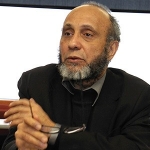 Frantz Voltaire, né en Haïti, a fait ses études universitaires à Santiago du Chili et à Montréal. Il a enseigné à l’Université du Québec à Montréal, à l’Université Nationale Autonome de Mexico, à l’Université du Chili à Santiago et à l’Université d’État d’Haïti. Il a reçu plusieurs bourses (Nations Unies, bourse d’Excellence de l’Université de Montréal, du Ministère Japonais des Affaires Étrangères du Japon etc.). Il a publié plusieurs études dont “Structure agraire et tenure foncière en Haïti”, “Le problème de l’habitat en Haïti”, “Haïti, crise structurelle et tutelle internationale”. Directeur fondateur du CIDIHCA, il a été consultant pour les Nations Unies, l’OEA, l’ACDI. Il a été chef de cabinet du Premier ministre Robert Malval de 1993 à 1994. Il a participé à de nombreuses émissions de radio et de télé (Radio Canada, Télé Québec, CBC, TVA, etc.). Il a été le commissaire de plusieurs expositions à la Bibliothèque Nationale d’Ottawa, à la Bibliothèque Nationale du Québec, à l’Université Concordia, à l’UQÀM, à l’Université de Toronto, à la Bibliothèque Publique de Vancouver. Il a été membre de jurys de cinéma à Genève, Marseille, La Havane, Martinique, Seychelles. Il a donné des conférences et participé à de nombreux séminaires dans différents pays. Il a produit et réalisé 5 documentaires pour lesquels il a reçu des prix, dont le prix Cora Coralina du Brésil pour “Port-au-Prince, ma ville”, le prix de l’ONF pour “Les Chemins de la Mémoire” et le Sunshine Awards de New York pour “Au nom du père… Duvalier”. Il dirige actuellement le Festival des films sur les droits de la personne de Montréal affilié au réseau international de films sur les droits de la personne et les Éditions du CIDIHCA.
Frantz Voltaire, né en Haïti, a fait ses études universitaires à Santiago du Chili et à Montréal. Il a enseigné à l’Université du Québec à Montréal, à l’Université Nationale Autonome de Mexico, à l’Université du Chili à Santiago et à l’Université d’État d’Haïti. Il a reçu plusieurs bourses (Nations Unies, bourse d’Excellence de l’Université de Montréal, du Ministère Japonais des Affaires Étrangères du Japon etc.). Il a publié plusieurs études dont “Structure agraire et tenure foncière en Haïti”, “Le problème de l’habitat en Haïti”, “Haïti, crise structurelle et tutelle internationale”. Directeur fondateur du CIDIHCA, il a été consultant pour les Nations Unies, l’OEA, l’ACDI. Il a été chef de cabinet du Premier ministre Robert Malval de 1993 à 1994. Il a participé à de nombreuses émissions de radio et de télé (Radio Canada, Télé Québec, CBC, TVA, etc.). Il a été le commissaire de plusieurs expositions à la Bibliothèque Nationale d’Ottawa, à la Bibliothèque Nationale du Québec, à l’Université Concordia, à l’UQÀM, à l’Université de Toronto, à la Bibliothèque Publique de Vancouver. Il a été membre de jurys de cinéma à Genève, Marseille, La Havane, Martinique, Seychelles. Il a donné des conférences et participé à de nombreux séminaires dans différents pays. Il a produit et réalisé 5 documentaires pour lesquels il a reçu des prix, dont le prix Cora Coralina du Brésil pour “Port-au-Prince, ma ville”, le prix de l’ONF pour “Les Chemins de la Mémoire” et le Sunshine Awards de New York pour “Au nom du père… Duvalier”. Il dirige actuellement le Festival des films sur les droits de la personne de Montréal affilié au réseau international de films sur les droits de la personne et les Éditions du CIDIHCA.
